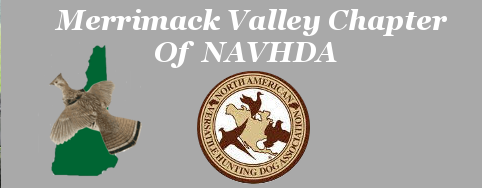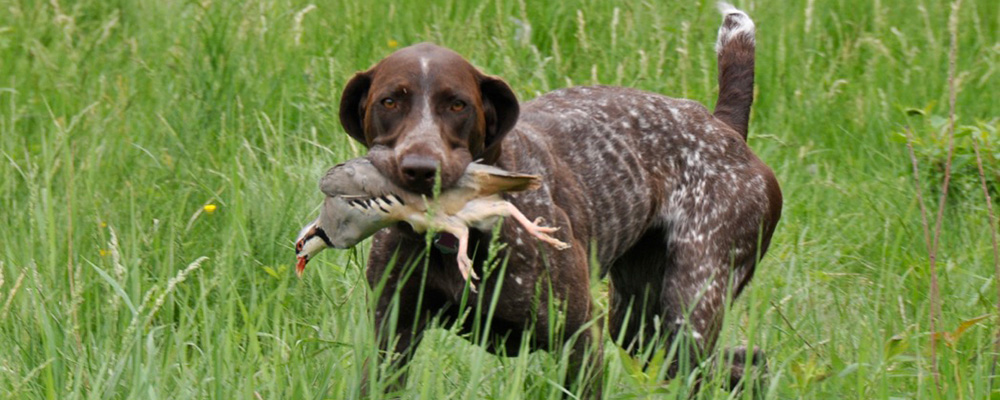Training Clinic Information
If you are new to NAVHDA, you may be wondering what happens at a training day. Hopefully the following information will you give you an idea about how our training clinics are run, and how the day goes. If you are interested in finding out about NAVHDA, you are more than welcome to come check it out. Families/kids are welcome to attend. It’s a great way to see different breeds of dogs and learn about training. It’s great for puppy socialization, too. We are always glad to see new people with interest in furthering their dog’s hunting ability. We allow a onetime training day for non-members. Come out and join us and get to know your dog better. A window of 6 – 14 days is open for online bird ordering at https://mvnavhda.com/fees/. The ordering deadline is 6:00 pm the Sunday before a training day. We encourage everyone, that will be training their dog with us, to review the NAVHDA Aims Programs Test
Rules (AIMS), Aims, Programs, & Test Rules – NAVHDA before beginning to train, and to familiarize themselves with how the NAVHDA program works
How the day begins
Our training days usually begin around 8:30 am. at Sharpe’s Farm in Hopkinton. It is a time for all the handlers to work with and help each other with training their dogs. Once check-in at the pavilion is completed, the handlers will be divided into groups within their Utility (UT) and Natural ability (NA) training levels.
Birds must be picked-up from the bird trailer before the start of training. You will need a bird bag or a bird crate for your birds. If you do not have a bag, you can borrow one from the equipment trailer. There will be one or two assigned volunteers, at the bird trailer, to hand you your order. Once you are in possession of your birds, we will no longer be responsible for them. Please do not remove any birds from the trailer without one of the trailer volunteers assisting you.
Natural ability: Chapter members, who have experience in UT, will lead each group through all three NA stations. The handlers for each group should help each other with bird planting, laying a pheasant track, and any other training assistance that may be needed within the individual groups. For those who have never planted a bird or laid a track, it will be demonstrated and explained by experienced handlers beforehand. Anyone may opt out of bird planting or laying a track if they wish. There is often downtime between stations. Handlers can use this time to work their dogs on heeling, and the use of woah boards. This can be done in the area adjacent to the pavilion. There will be someone available at the site to help and instruct handlers with the exercise. NA handlers should stay with their group until everyone has run their dog through all three of the training stations, field, tracking, and water.
Utility: The handlers will be divided into the water and field groups. Running order for the field will be assigned at check-in.
Water – The group will be lead by one or two members with Invitational experience. The caution buoy should be set before any water work is started. Handlers should work with each other with setting up, running, and taking down the heeling course, the blind with decoys, and the winger zinger. The drag is self paced, and can be done with the help of another handler in a suitable location near the dike. The “search for the duck” requires at least one or two handlers to use the kayak during the duck searches. Handlers are encouraged to speak-up and ask if their help is needed with the kayak.
Field – The UT field takes the most time of all the training stations. Three experienced chapter members, two gunners and a trainer, will work with the handlers to run their dogs through the exercise. Handlers waiting in line should plant the birds for the handler that is next up for field work. Once a handler has completed their field work they should proceed to the dike side to relieve a handler that is waiting to do field work. Handlers can help with blind work & drags while they are waiting for their water work to be done. Handlers that have completed their field & water work should stay on the dike side and help out until everyone has completed water
training.
The last handlers to leave the dike site are asked to bring all training equipment and signs back to the trailer at Sharpe’s farm.
At NAVHDA training clinics, you can have fun with your dog and enjoy the camaraderie of a great group of people who share their experiences and knowledge with training a hunting dog. Remember, we are not training your dog for you, we are assisting you in training your own. We are here to help you train and develop your Versatile Hunting Dog, whether to train for occasional hunting, or becoming a Versatile Champion.
Please drive slowly on the roads leading to the training sites at 15 mph. We must be respectful of the people that live there. NAVHDA welcomes all families and kids to come check us out and learn more about training their dogs. It’s a great way to see different breeds of dogs and get to know your pup better.
Training/bird costs
- Training fee: $27 (for use of the fields, port-a-potty, etc.)
- Chukar: $tbd
- Pheasant: $tbd (when available)
- Ducks: $tbd (usually just available for water clinic)
- (usually, 2 or 3 Chukka are sufficient for a training day)
Bird costs are subject to change without notice.
Bird Purchasing Policy
Food/Refreshments
Lunch is not provided on training days, bring your own lunch and refreshments.
There is a Dunkin Donuts about 15-20 minutes away and a convenience store slightly further if you forgot to bring something. We strongly encourage everyone to bring enough water for themselves and their dogs.
What to bring
Training days are held rain or shine, so come prepared. For you, weather appropriate clothing, bug spray, sunscreen, drinks, snacks, etc. The fields can be wet, so waterproof boots are recommended. There is some shade and a shaded pavilion at Sharpe’s with some seating. Folding chairs might come in handy. There is very limited shade at the UT water site parking area. There is no shade at all at the water. A tarp/pop-up shelter to provide shade for yourself and your dog is recommended there.
For your dog, bring plenty of water. It can get really warm and there is no drinking water at the training site. Bring whatever training gear you use. Leash, check cord, e-collar, whistle, dummies, etc. The Chapter has some equipment available like retrieving bumpers, place boards, blinds, heeling stakes, etc. A crate or stake-out is recommended. Unless your dog is in the field, they should be leashed, crated, or tied out. Training time is limited, and we need to be considerate to other dogs and handlers in the field. Dogs running loose could interrupt others training time.
Emergency Vet Information
Capital Area Veterinary Emergency Service 24hrs.
1 Intervale Rd. (Exit 1 off Rte. 393, straight at light)
Concord, NH 03301 1-603-227-1199
http://www.capareaves.org

